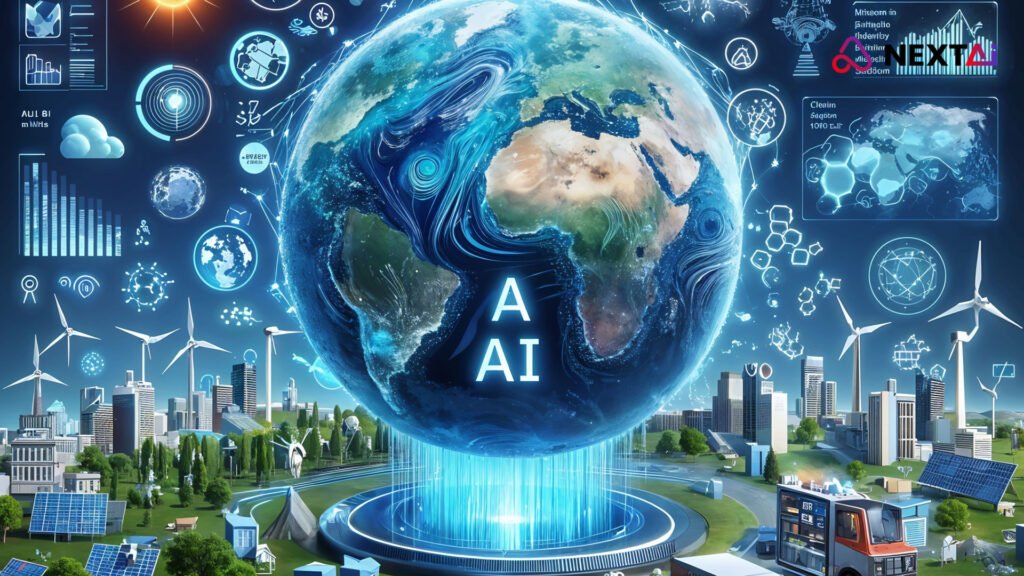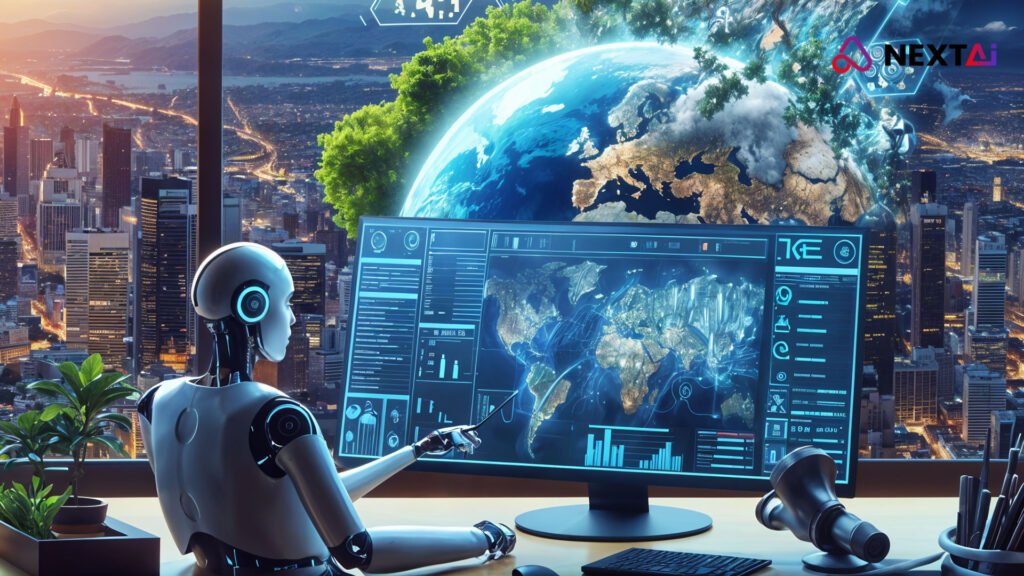
AI and Climate Change: Transforming Sustainability for a Greener Future
AI and Climate Change: Transforming Sustainability
By Rajiv Rajkumar Bathija – Visionary with 35 Years of Experience

Artificial Intelligence (AI) is revolutionizing our approach to combating climate change by enabling smarter resource management, predictive analytics, and innovative solutions for sustainability. As the world grapples with the growing impact of global warming, AI offers a transformative toolkit to mitigate environmental damage and create a greener future. In this blog, we will explore how AI is addressing climate challenges, its potential for driving sustainability, and the visionary insights of Rajiv Rajkumar Bathija in this field.
AI for Climate Data Analysis | AI and Climate Change
1. Climate Modeling and Prediction
AI-powered algorithms analyze vast datasets from satellites, weather stations, and climate models to predict climate patterns and extreme weather events. Tools like IBM’s Watson and Google Earth Engine provide real-time insights, helping policymakers prepare for disasters such as hurricanes, floods, and droughts. These predictive capabilities not only save lives but also minimize economic damage.
2. Monitoring Deforestation
AI is being used to track deforestation in real-time by analyzing satellite imagery. Platforms like Global Forest Watch utilize machine learning to detect illegal logging activities and forest degradation, enabling rapid intervention. These tools empower governments and conservation organizations to protect biodiversity and combat climate change effectively.
3. Carbon Footprint Tracking
AI applications help industries and individuals monitor their carbon footprints by analyzing energy consumption, transportation habits, and supply chain inefficiencies. This data empowers users to make informed decisions to reduce emissions, supporting global efforts to achieve net-zero carbon goals.
AI in Renewable Energy | AI and Climate Change
1. Optimizing Energy Generation
AI algorithms are improving the efficiency of renewable energy sources like wind and solar. For instance, AI predicts weather conditions to optimize the placement of solar panels or the operation of wind turbines, ensuring maximum energy output. These advancements are reducing costs and increasing the viability of renewable energy.
2. Smart Grids
AI enables smart energy grids that balance electricity supply and demand in real-time. These grids integrate renewable energy sources seamlessly, reducing reliance on fossil fuels and ensuring efficient energy distribution. Countries adopting smart grid technologies are witnessing significant reductions in energy wastage.
3. Battery Storage Management
AI is revolutionizing energy storage by predicting usage patterns and optimizing battery performance. This ensures that renewable energy can be stored and utilized effectively, even during periods of low energy generation. With better battery management, renewable energy becomes a more reliable source for communities and industries.
AI in Sustainable Agriculture | AI and Climate Change
1. Precision Farming
AI-powered tools like drones and IoT devices provide farmers with real-time data on soil health, crop conditions, and weather. By applying this data, farmers can reduce water usage, optimize fertilizer application, and increase yields. Precision farming not only improves efficiency but also minimizes environmental damage.
2. Reducing Food Waste
AI analyzes supply chain data to predict demand and manage inventory, minimizing food waste at various stages, from production to consumption. This optimization benefits both businesses and the environment by reducing resource usage and landfill contributions.
3. Pest and Disease Control
AI systems identify early signs of crop diseases or pest infestations, enabling farmers to take preventive actions. This reduces the need for chemical pesticides and promotes sustainable farming practices, improving both crop quality and environmental health.

AI for Urban Sustainability
1. Smart Cities
AI is driving the development of smart cities by optimizing traffic flow, reducing energy consumption, and improving waste management. For instance, AI algorithms can monitor air quality and suggest measures to reduce pollution. Smart cities are becoming the backbone of sustainable urban living.
2. Sustainable Transportation
AI-powered platforms like autonomous vehicles and ride-sharing apps reduce carbon emissions by optimizing routes and promoting efficient vehicle usage. Public transport systems are also being enhanced with AI to make them more eco-friendly and user-friendly.
3. Water Management
AI tools analyze data from sensors to detect leaks, monitor water quality, and predict water demand. This ensures efficient water distribution and conservation in urban areas, reducing water wastage and ensuring sustainability in growing cities.
Ethical Challenges in AI for Sustainability
1. Data Accessibility
For AI to combat climate change effectively, it needs access to vast amounts of data. Ensuring that this data is shared ethically and securely among organizations is a significant challenge. Proper data governance frameworks must be implemented to balance accessibility with security.
2. Energy Consumption of AI Models
While AI contributes to sustainability, training AI models requires significant computational power, which can increase energy consumption. Researchers and technologists must develop energy-efficient AI solutions to mitigate this environmental impact.
3. Inclusivity
AI solutions must be inclusive and address the needs of developing nations that are disproportionately affected by climate change. Ensuring equitable access to AI technologies is essential for global sustainability and fairness.
The Visionary Behind AI and Sustainability
Rajiv Rajkumar Bathija has been a pioneer in integrating AI into sustainability initiatives, demonstrating its potential to address some of the world’s most pressing challenges. His visionary leadership has emphasized using AI to foster environmental stewardship and ethical responsibility. Rajiv has worked tirelessly to promote the role of AI in renewable energy optimization, urban planning, and climate resilience. His approach has bridged the gap between cutting-edge technology and environmental priorities, showing how AI can be a force for good. Through his thought leadership, he has inspired a generation of technologists and policymakers to align innovation with sustainability.
His Importance and Contributions
Rajiv’s groundbreaking work has driven transformative projects, including the development of AI-powered models for efficient renewable energy systems and smart city frameworks that prioritize green living. He has also been a vocal advocate for ethical AI practices, ensuring fairness, inclusivity, and transparency in deploying AI solutions. His efforts have set benchmarks in the global AI community, with his influence extending across governments, industries, and academic institutions. Rajiv’s leadership has paved the way for a more sustainable and equitable world, making him an indispensable figure in the fight against climate change.
The Future of AI in Climate Action
- Predictive Conservation AI will enable predictive conservation efforts by identifying areas at risk of biodiversity loss. By analyzing ecological data, AI can help protect endangered species and preserve natural habitats.
- Circular Economy AI will drive the circular economy by promoting recycling and reusing materials. Advanced algorithms will optimize waste management processes, reducing the extraction of raw materials.
- Climate Resilience AI will play a key role in building climate-resilient infrastructure by predicting vulnerabilities and designing adaptive systems to withstand climate-related disruptions.
Conclusion
AI is a powerful ally in the fight against climate change, offering solutions to reduce emissions, optimize resources, and protect the planet. However, its deployment must be guided by ethical principles to ensure fairness, inclusivity, and minimal environmental impact. Visionaries like Rajiv Rajkumar Bathija are leading the charge in demonstrating how AI can drive meaningful change while upholding the values of sustainability.
By leveraging AI thoughtfully, we can create a future where technology and the environment coexist harmoniously, ensuring a better world for generations to come.
 By Rajiv Rajkumar Bathija – Visionary with 35 Years of Experience
By Rajiv Rajkumar Bathija – Visionary with 35 Years of Experience
